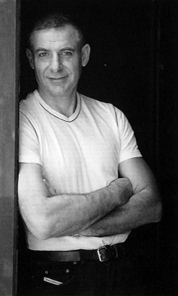Architecture of Tears
Stories, Poems, Aphorisms
by Demosthenes Davvetas
ISBN-13: 978-1-893207-05-9
ISBN-10: 1-893207-05-6
PRICE: $10.00 Regular Edition
$50.00 Signed and Numbered Edition
EP 11: DEMOSTHENES DAVVETAS writes, in his second book with Edgewise, ARCHITECTURE OF TEARS: STORIES, POEMS, APHORISMS (for his first with the press, IN THE ASHES OF REPRESENTATION, see THE GIFTS / I DONI): “You know how it is when you’re falling and you instinctively reach out to grab hold of something, so it was with me at the moment of disaster. I held on to something familiar: words. Words were the life-raft on which I spent endless hours drifting in an ocean of tears on a voyage that has still not come to an end. But now, after such a long time, the life-saving words have become part of my body, my third hand, witness to my experiences, material for my literary language, and, at the same time, an implement essential to my work.
“Within the endless solitude of tears, I found an opportunity to write some poems, aphorisms, and stories. The poems and aphorisms need very few words. They are like bolts of lightening from the sky, surprising even me with their directness and occasional insight. Regarding the stories, their very nature requires more structural elements, so there are more words, although not so many as to overwhelm the reader. My intention is not to use any more words than are necessary to put a minimum of flesh and bones on the skeleton of the stories. In them, the protagonists are conceptual figures. Words aspire to be punches rather than soothing aesthetic caresses. The heroes’ actions create an atmosphere of tension and enchantment in which destruction and birth, tearing down and building up, the real and the imaginary all co-exist in a fertile equilibrium. Thanks to the extreme mobility of the figures, the concepts of geography, history, nation and race are abolished, allowing these protagonists to live in a state of on-going metamorphosis. And they, in turn, transform reality. I am talking not about transforming the external world alone but the internal one, as well. I am talking about the metamorphoses of projections of my (our?) self.”
Through story-telling, epiphanic utterances, and philosophical rumination, that is, through fiction, Davvetas reaches for the truth of the Subject as it peers around the object of experience (and so-called objectivity) and challenges the dictates of reality.
DEMOSTHENES DAVVETAS was born in Athens in 1955. From 1982 to 1988, he was an art critic for Libération. In 1999, he received his doctorate in arts and letters at the Sorbonne. He has written catalogue essays for many artists, including Gilbert and George, Georg Baselitz, Cy Twombly, and Joseph Beuys. Among his novels and books of poetry are La chanson de Pénélope (Galilee, 1989), Soleils immatériels (Galilee, 1989), Les manteaux de Laocoon (Galilee, 1991), L’incendie de l’oubli (Galilee, 1992), and Poèmes (Voir, 1995). He lives and works in Paris and Athens (Greece).
First edition paperback, April 2001, 64 pp., sewn, bound, and printed in Italy, with a two-color cover and a black and white photograph of the author on the frontispiece.


